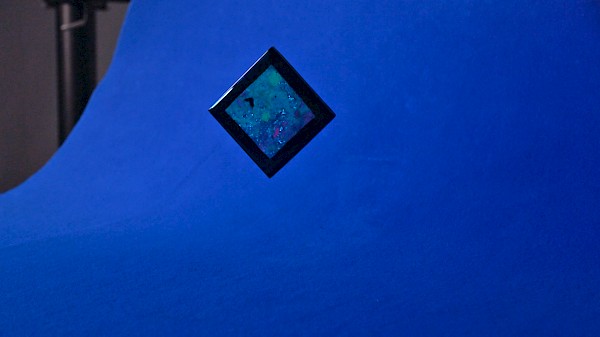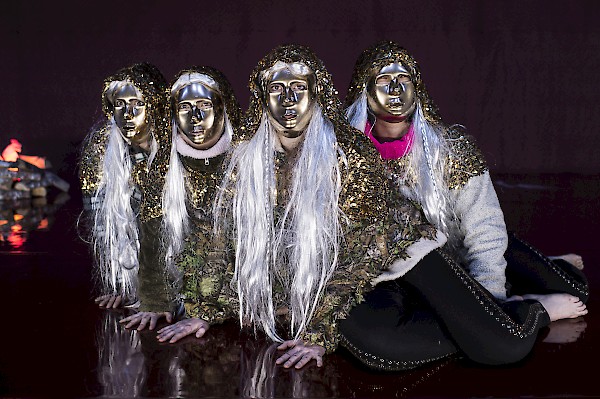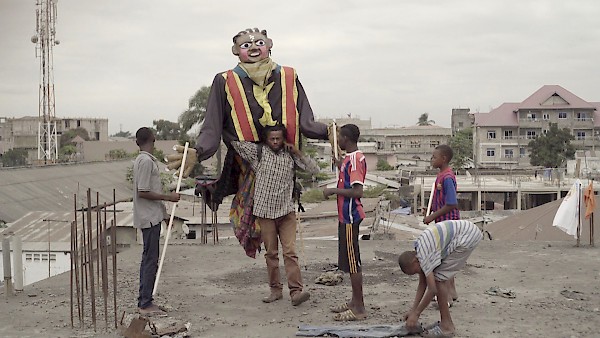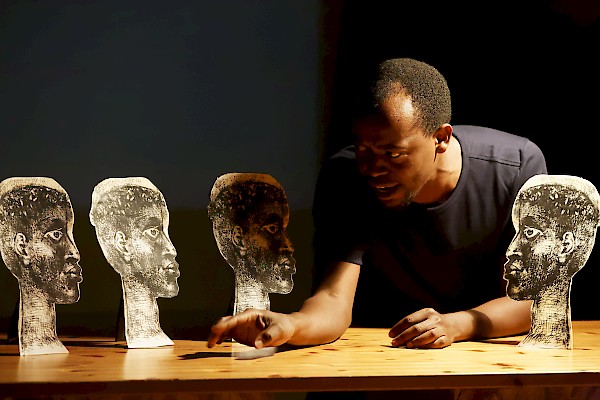Bâtard - Day 2: Nadja Hjorton, Ogutu Muraya, Riley Harmon, Anne Reijniers & Rob Jacobs

© Gert Jan Van Rooij
Riley Harmon A method for blue logic
19:00-23:00
In 2012, Riley Harmon received an email from a conspiracy theorist. He was confused with a homonym, an actress who would have been created by the government to mislead the media. As an uncertain exploration of this mail he created the film A method for blue logic: in which you lose grip on what is real and what isn’t.
Relentless - Tom Engels invites Göksu Kunak
19:00–19:45
What does it mean to perform today? What do we want to perform? What do we want to stand for? What matters? What brings us to doing what we do? Why do we keep insisting, fighting waves of incompatible thoughts? What do we lend our bodies and minds to? What do we want to be penetrated by? Shall we be relentless? Shall we embody that which never seizes? Lingering questions in a world facing crises – manifold and manywhere.
On the occasion of Batard 2016, Tom Engels publishes relentless, a volume of fierce pieces by Bojana Cvejić, Samlingen (Amanda Apetrea, Nadja Hjorton, Stina Nyberg, Halla Ólafsdóttir and Zoë Poluch), Göksu Kunak, Bryana Fritz, Hana Miletić and a pirate. During three consecutive evenings, Tom Engels invites guest to launch the publication.

© Chrisander Brun
Nadja Hjorton Medea – it’s a classic
20:00–21:00
Medea is a very annoying person. To avenge her boyfriend Jason she kills her children, and takes the opportunity to kill King Creon and his daughter while she’s at it. But she is also an oppressed, humiliated woman who rises and does the impossible - she slaughters patriarchy, reproduction and heteronormativity during one thrilling day in Corinth. Medea – it’s a classic uses Euripides’ play Medea to move around questions about which narratives we implicitly and explicitly choose to reproduce, assuming that by choosing we also do a large gesture of excluding. It uses the classic tragedy - its function, aesthetics, symbolism and structure - as a filter for choreography and music. With too-much-of-everything and Dionysian decadence Medea – it’s a classic wants to include more narratives in the Medea myth.

Anne Reijniers & Rob Jacobs – Échangeur
21:00-21:30
In the streets of the metropolis of Kinshasa, young Congolese imagine their version of the colonial past. While archival footage shows how the statue of explorer Stanley is being towed by a crane, a Lumumba imitator is looking for former president Mobutu. A man scrubs manhole covers until the word 'Leopoldville' becomes legible again. A boy with a whitewashed face, tropical helmet and whip, dances with ghosts on a roof. After the Democratic Republic of Congo gained independence, the Belgian colonial monuments were removed from Kinshasa's public squares. Today they stand side by side in the Congolese National Museum. In Échangeur emerges an imaginary city around an empty pedestal, where archival footage, performances and present-day Kinshasa interact.
Talk URBAN SPACE: A SITE OF REPRESENTATION with Anne Reijniers and Rob Jacobs
21:30–22:00
To open up a new space for encounters and shared thinking within the festival programme, this year, Batard would like to introduce to you the invited artists in a series of public talks. Each night two artists/collectives will join Maria Rößler for a conversation about concepts and questions that they are concerned with in their artistic research. These talks are a unique opportunity to get to know the international festival artists outside and beyond their performances. They will take place each night of the festival, in the time between two performances. Admission is free.
Maria Rößler lives and works between Amsterdam and Berlin. She studied Theatre and Media Science in Berlin and Dublin. As a producer and dramaturge, she has worked for performing arts productions, festivals and conferences. From 2013 until 2016, she was part of the artistic programme team of Foreign Affairs festival at Berliner Festspiele. Besides, she pursues independent projects including an on-going collaboration with technologist Nathan Fain. Together they developed the performance “Right Is the Might of the Community. A lecture on future democracy“, commissioned by HAU Berlin, which was presented by Batard in 2015.

Ogutu Muraya – Fractured Memory
22:00–23:00
The great force of history comes from the fact that we carry it within us, are unconsciously controlled by it in many ways, and history is literally present in all that we do… And it is with great pain and terror that one begins to assess the history that has placed one where one is, and formed one’s point of view. – James Baldwin
Through interlacing literary text, video projection and storytelling, Ogutu poses the question - how to deal with an inherited history full of complexity. The piece reimagines James Baldwin’s essay ‘Princes and Powers’ which describes in great detail a congress of Afro-intellectuals, writers, artists, philosophers and theorists, held at the Sorbonne in Paris in 1956. Central to his research and this performance is a multiplicity of perspectives which includes Baldwin’s essay, historical archive, and personal experience.
Through examining the legacy of the congress, injecting the personal and creating fiction, the performance becomes a shift of perspectives, disjointed voices and fractured contours. The performance aims to create an acknowledgement of a shared history and find a new vocabulary to deal with its uncomfortable truths. Ogutu explores the boarders between oral and visual narrative in order to create a multi-dimensional space that is discontinuous and characterized by fragmented time. A space where the teller and the image form a dialogue.
Nadja Hjorton Medea – it’s a classic
initiator: Nadja Hjorton
with and by: Daniel Andersson, Halla Olafsdottir, Stina Nyberg, Nadja Hjorton
co-creator: Shirley Harthey Ubilla
composer: Britta Persson
lights, set design and costume: Chrisander Brun
photo: Chrisander Brun
producer: Siri Hjorton Wagner
Medea is a co-production between MDT, Uppsala Stadsteater, Norrlands operan and ÖFA-kollektivet
residency: Turteatern, Reykjavik Dance Festival
supported by the Swedish Arts Council, the city of Stockholm and the Stockholm County Council | the presentation is part of the project [DNA] Departures and Arrivals, which is co-financed by the Creative Europe program of the European Commission
Anne Reijniers & Rob Jacobs Échangeur
a film by: Rob Jacobs and Anne Reijniers
with: José Batekele, Jude Mansita, Klarchi Ngonde, Ange Katalea, Dieu Ndebo, Tiliton Kuzana, Docha Glody, Vialig ze Ngonde, Kimvuidi Lema Chef, Banzila Yemeyi Desire, Arqabound Kabunda Mbuyi Mick, Widjo Wiyombo, Erwan Soumhi research: Davy Verbecket, Rob Jacobs, José Maria Masanga, Nizar Saleh Hirji, Widjo Wiyombo, Anne Reijniers
production: Rob Jacobs, Anne Reijniers, Thijs Paijmans, Koen Bleuzé, De Imagerie, Het Bos
image: Anne Reijniers
sound: Anne Reijniers and Erwan Soumhi
editing: Rob Jacobs and Anne Reijniers
sound editing: Aïda Merghoub
sound mixing: Michel Coquette
grading: Thijs Paijmans
advice: Elias Grootaers, Martine Huvenne, Lotte de Bruyne, Hilde D'Haeyere translation: Veerle Duflou, José Maria Masanga, Nizar Saleh Hirji, Aïda Merghoub, Christopher Daley
title design: Mario Debaene
Ogutu Muraya – Fractured Memory
composition and performance: Ogutu Muraya
dramaturgical and direction assistance: Esther Mugambi and Noah Voelker
initial research with: Nele Beinborn
with advice from: Nicola Unger & Andrea Božić
filming & editing: CitéNOIR
image: Thomas Lenden
produced by: Das Theatre
special thanks: Roland Albrecht, Akira Milan, Lena Graber, Dirk Verstockt, Edit Kaldor, Muthoni Garland and Al Kags